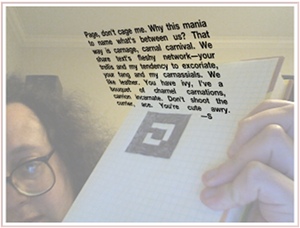Monthly Archives: March 2011
Today I went to a presentation by Amaranth Borsuk, a poet who plays with "textual materiality" -- meaning, if I can give a biased summary, the study of the user interface of text.
Tags: amaranth borsuk, calligraphy, poetry.
Alex Feinman writes a very insightful analysis on the cultural assumptions and pressures that caused the “Straight Male Gamer” to feel threatened when his male player-character in Dragon Age received come-ons from other men. Even though the game prominently offers the choice to turn these offers down, Alex argues, that player’s culture lacks adequate training — especially for boys — on gracefully rejecting benign-but-unwanted advances.
So now that poor, helpless gamer is stuck in quite a conundrum. He doesn’t want to fuck this man. But he doesn’t know how to say no in this situation. He doesn’t even know that he doesn’t know—he just knows that he feels trapped. He can’t even see the problem. So it must be the fault of the rejected—that’s the pattern he knows.
This pattern is writ large in our society. “You can’t let a woman ask a man to dance! What if he doesn’t want to?” We mostly learned that one already. “You can’t have gays in the military—what if one of them comes on to a Marine?” Gee, I guess then the Marine has to learn how to say no, in a way that doesn’t harm unit cohesion. “You can’t have interracial marriages—it makes me feel icky. What if a black woman asked me out?” Well, maybe you should date her. Or maybe you should say no in a manner that doesn’t upset her. “You can’t let fat people think they’re sexual human beings who deserve to live! What if—”
It’s everywhere.
Bonus reading: via Twitter, Adam Cadre points out a relevant excerpt from the webcomic Bad Machinery.
Tags: culture, digital games, links, sex.
Back in my season of IF interviews, a few months ago, I was asked about my influences from outside the game-design world. I said:
...Diana Wynne Jones describes the fantastical by grounding it in the reader’s unconscious knowledge of the real world. I try to do all these things. (-- interview in Black Clock, Jan 13, 2011)
I learned on Saturday that Diana Wynne Jones has died. She has been ill for a couple of years now, a fact that I kept remembering and then thrusting from my consciousness. Such things make no sense. She has been in my library and in my head for three-quarters of my life; I might have been ten when I stumbled into Dogsbody. I might have been younger.
More and better writers than I are writing remembrances this week. I can only say that on my shelf of most-important books, The Homeward Bounders and Fire and Hemlock and Archer's Goon are untidily lined up.
Diana Wynne Jones insisted on the rough, solid, believable, ordinariness of life -- and that includes life lived in Elfland, life in a walking castle, life at a science fiction convention, life in the future or past or outside of time. All of these are as solid as the house you grew up in, or the time your brother pushed you into the snow, or the butter pies you dreamed of eating. Fantasy has moved on to boy wizards at school (really?) and heroes who turn into wolves (really?), but Diana Wynne Jones just kept telling us how to do it, over and over.
Tags: diana wynne jones, obituaries, writing, zarf.
Enjoyed the train ride down to Philadelphia. Met up with Will Hopkins, who arranged this whole shebang on behalf of the Swarthmore Psi Phi Club and the Forum for Free Speech. (Free Speech? I don't know, I just get on the train.)
On Saturday afternoon I gave a somewhat-extended (or maybe just rambling) version of my Writer's Guide to IF talk. A bunch of us then chatted about IF over lunch, broke for a few hours -- Swarthmore has a darn lovely campus to wander around on -- and then I went to dinner with Psi Phi. I can only say that campus geek societies are all the same, but each is the same in its own unique way. Psi Phi conducts annual pterodactyl hunts. You might want to look into it.
In the evening we set up to play Slouching Towards Bedlam by Star Foster and Daniel Ravipinto. Two hours of group play got us through nearly all of the plot exploration. It so happened that the players managed to get killed right then, triggering one of the game's endings, so I called time. I figure it's better to leave people interested in exploring the other game options. Plus, two hours is a while.
If you missed this event (and, really, most of you did) you can catch me and similar IF discussions at Balticon in May. I'll probably keep doing this sort of IF presentation in various places. Not frequently, because travel eats life, but occasionally. After Balticon, maybe somewhere in the fall.
I had a fun time. I think everybody who showed up had a fun time. I'm sorry that Will's office caught fire, though.
Tags: if, swarthmore, travel, zarf.
Nick Montfort presents Curveship, the experimental narration-centric IF development system that he released last month. (Yes, he’s using an upturned hotel bed as a projection screen. I mentioned that the IF suite was crowded, right?)
Unfortunately, it seems I spoke too soon about no cut-short PAX videos this year; I was surprised to discover that this one ends abruptly after around 22 minutes. However, this accidentally abridged talk still summarizes Curveship’s purpose, form and strengths quite well. If it whets your appetite to learn more, visit Curveship’s website.
Part of Saturday’s proceedings at the 2011 IF Summit that conveniently adjoined this year’s PAX East.
In adventures and other explorational games, the setting is often the most eloquent and memorable character: an island, a castle, a starship. How do these locales tell stories, and how does the player character fit into those stories?
This panel discussion features independent IF creators Andrew Plotkin, Stephen Granade, and Rob Wheeler, and Dean Tate of Harmonix (formerly of Irrational Games).
Tags: conferences, game design, if, interactive fiction, pax, talks, videos.
Here’s the first of three 2011 IF Summit event videos that The Gameshelf shot at PAX East. Unlike last year’s videos, I actually prepared a little for these, so there’s no sudden cut-offs due to battery death. I’ll also try to improve these videos’ visibility over last year’s by putting each into a separate blog post.
This one is the Non-gamers Gaming panel, featuring Heather Albano (Choice Of Games), Tim Crosby (Disruptor Beam), Caleb Garner (Part 12 Studios), Sarah Morayati (independent creator), and Andrew Plotkin (Zarf). Rob Wheeler manned the camera.
How do you design challenges for gamers who haven’t played the last thirty famous entries in the genre? What about readers and writers who do not identify as gamers?
Click here to watch this on Vimeo.
I must still apologize for the murky video quality, but it’s the best we could squeeze from my little Flip Video in the cramped and crowded hotel room that Friday’s IF events took place in. (Saturday found us instead enjoying a large and well-lit conference room, and the next video will reflect that.)
Tags: conferences, if, interactive fiction, pax, talks, videos.
Robert Krulwich doesn’t lie, which forces me to conclude that Chess Boxing is an actual thing.
We start in a ring. There are screaming fans. The first round is 4 minutes of chess, followed by 3 minutes of boxing, then chess, then boxing, for 11 rounds. You win by knocking out your opponent or checkmating him, either way.
As Krulwich writes, Chess Boxing has apparently been practiced for close to a decade, in a growing number of venues around the world (after starting in Amsterdam). That I had never heard of it before today reminds me that the world of games will always be far larger — and weirder — than I’ll ever completely grasp, bless it.
(And, given the subject matter behind of our banner artwork, perhaps I ought to declare Chess Boxing the official sport of The Gameshelf…)
Last Sunday I finally finished reading and working though Aaron Reed’s Creating Interactive Fiction with Inform 7, a book that Andy’s already written about here. I felt it worth noting my own thoughts, briefly, as someone who isn’t an Inform expert (unlike Andy, whose name appears in the language’s credit roll, for zog’s sake).
Tags: books, if, inform, interactive fiction.
Dan Feyer won the American Crossword Puzzle Tournament this past weekend. Andrew Greene has collected a list of #ChuckNorrisFacts-style jokes about his preternatural grid-filling abilities, penned by those who were humbled by him in person. A sampling:
I once had an idea for a crossword but I decided not to construct it because Dan Feyer had already solved it.
When Will Shortz says “On your marks, get set, GO!”, Dan Feyer gets up and goes, because he’s done.
IBM considered calling its Jeopardy computer “FEYER” but didn’t want to insult Dan Feyer.
Tags: competitions, jokes, links, puzzles.
I played Life Flashes By last year, when the first public release appeared. The author had previously demoed the game at the IF gathering at PAX Prime in Seattle, so I'd already seen a "middle" chapter of the work.
I didn't write anything at the time, because I am lazy and then because Emily Short wrote a column that was more perceptive than what I was thinking. However, now it's been another few months; Life Flashes By has circulated around the various gaming communities and been discussed some; it's been featured in the recent IF Demo Fair; and Deirdra Kiai is declaring a full, final, let's get this thing on the road release. (Available as free download or collector's edition.)
"So now what do you think, smart guy?" Hm.
Tags: deirdra kiai, design, if, life flashes by, narrative, sludge.
I wrote a whole lot about last year's PAX IF events, because that was my first PAX and everything was exciting and new. Now it's my third (two in Boston, one in Seattle) and... everything is ho-hum and tired? No. It was an exciting weekend. But I may gush less about it this year.
Tags: boston, convention, if, kickstarter, pax, pr-if, quixe, vorple.
 Last year at PAX East, an anonymous riddler dropped a stack of mysterious USB thumbdrives in the People’s Republic’s hospitality suite. The Wingding characters emblazoned upon them, it turned out, were the first key to cracking the code-based puzzles found in the drives’ data. The rewards were a series of playable Infocom spoofs, starting with a mutation of Zork where the thief appears to have been replaced with Rick Astley. (He sings exactly what you’d expect.)
Last year at PAX East, an anonymous riddler dropped a stack of mysterious USB thumbdrives in the People’s Republic’s hospitality suite. The Wingding characters emblazoned upon them, it turned out, were the first key to cracking the code-based puzzles found in the drives’ data. The rewards were a series of playable Infocom spoofs, starting with a mutation of Zork where the thief appears to have been replaced with Rick Astley. (He sings exactly what you’d expect.)
At PAX east 2011, they struck again, silently insinuating one more thumbdrive into the suite’s washroom. I discovered it while helping to lock the place up on Sunday, pocketed it… and immediately forgot about it. But then, just last night, a twitter account connected with last year’s riddles cleared its throat at us, and I remembered again! Much frenzied solving on IFMud followed.
Solvers were curious at the payload’s size, which at more than 60 MB is far larger than any of last year’s puzzle-packets. “It might be just a giant rickroll,” I suggested, and… well, you can read the results yourself.
As I write this, the solvers on the Mud are still scratching their heads over what appears to be an audio-steganography puzzle. If you’d like to lend a hand, you can grab your own copy of the thumbdrive’s contents and then join us on IFMud, where we’re using the chat-channel #PAX-USB-drive.
Update: Wow, looks like the team on the Mud cracked it literally within minutes of my posting this. Nice job! (The transcript linked above now reflects this.)
I’d like to offer my appreciation to the merry pranksters who are keeping this little game going. We’re all having fun with it, and even if it sometimes takes us adventure-game fanatics a little while to figure out where the puzzles are, at least we’re in-character enough to pick up and carry around everything that looks remotely interesting.
Image credit: Photograph by David Marriott Jr. (CC BY-NC-ND)
Tags: if, interactive fiction, pax, puzzles.
Boston-based Lantana Games has launched a Kickstarter page for Children of Liberty, a stealth-based platformer they’ve been working on for the last year or so. They seek $5,000 to purchase equipment and software that’ll help them finish the work.
Beyond being a valued and respected member of the Boston-area indie-developer community, Lantana knows that the best way to get me to embed a Kickstarter video on my blog is to prominently feature my own voice in it. So here you go:
Aside from loving to hear myself talk, as a lifelong New Englander I also have to love the game’s setting and theme, where the stealthy protagonists are child agents of the Patriots on the eve of the American revolutionary war. Really looking forward to seeing the final product.
Tags: boston, children of liberty, kickstarter, links.
As a happy little followup to my outsider’s view on watching Slam Bolt Scrappers develop, today on Penny Arcade Eitan tells the same story from his own perspective. So if you liked my article, you should go read that one too.
(Thanks to Amy for the link!)
Tags: boston, game development, links, slam bolt scrappers.
 Fire Hose Games’ Slam Bolt Scrappers goes on sale today on the PlayStation Network, and if you’re so equipped I suggest you have a look at it. I’ve been following the progress of this game since I first met Fire Hose founder Eitan Glinert at the inaugural Boston GameLoop in 2008, and it involves one of the most amazing development stories I’ve been privileged to personally watch unfold.
Fire Hose Games’ Slam Bolt Scrappers goes on sale today on the PlayStation Network, and if you’re so equipped I suggest you have a look at it. I’ve been following the progress of this game since I first met Fire Hose founder Eitan Glinert at the inaugural Boston GameLoop in 2008, and it involves one of the most amazing development stories I’ve been privileged to personally watch unfold.
At the start of 2010, the nascent Scrappers was a side-scrolling action-adventure about superheroic construction workers, flying around and patching up bursting dams. I watched the developers demonstrate it at a local monthly game-developer gathering, and found it rather impressive. For the Fire Hose crew, though, it wasn’t quite gelling as a compelling play experience.
A few weeks later, I visited Eitan at a game-marathon-for-charity event that GAMBIT was hosting. He gratefully took a break from his nonstop playthrough of the first Final Fantasy to show me Scrappers’ current version. It barely resembled what I’d seen before: gone was the scrolling cityscape of crumbling dams and waterspouts, replaced with something that at first glance looked like a Tetris-based minigame.
Eitan explained to me that, while kicking around ideas for gameplay variants, the Fire Hose team hit on the seed of a uniquely chaotic multiplayer falling-block battle. They immediately saw that this model held an entire, sellable game all by itself, and that game was fun. And so, they decided to clear the table of the old design — with god knows how much time and resources poured into it — to focus on developing this idea instead.
Jason Dyer explores Will Crowther’s Adventure — the truly original proto-game, that is, before Don Woods got his hands on its source code and turned it into the work that defined computer-based gameplay for many years. I was under the impression that this ur-version was lost to time, but it looks like Dennis Jerz dug it up a few years ago.
Jason’s description of the rough-hewn game is oddly haunting, the map of a dim dream-world that doesn’t quite exist yet.
However, one gets the strong sense this was an abandoned work in progress. The bottom level (with Bedquilt and the Swiss Cheese Room) has exits that don’t work, and one that crashes the game. The area even has a sign that says: ‘CAVE UNDER CONSTRUCTION BEYOND THIS POINT. PROCEED AT OWN RISK.’ I first took this sign as an signal of danger in the in-game universe, but instead it appears to be Crowther’s marker that the code is unfinished past that point.
There’s a long featureless hall to the west leading to nothing.
You too can learn the shocking truth of what the very first GETtable LAMP might actually have been shaped like!
Tags: history, if, interactive fiction, links.
Zarf’s already posted the schedule of IF-related events at PAX East 2011 (this coming weekend!), but as an egomaniac I just wanted to highlight the one event I’m directly involved with: Zarf and I are going to reprise the lightning-talk introduction to Inform that we first presented at GameLoop last summer. We’re going to build a very small game that shows off some of Inform’s major features, especially its natural-language syntax.
I love presenting Inform like this, because the language essentially sells itself. To my knowledge there is simply no other practical-use programming language on the planet, in any domain, whose source code reads like Inform’s. If you’ve never seen the language before, I could stand up there and implement the phone book at you, and it’d knock your socks off. So banging out a whole game in 45 minutes, with NPCs and puzzles and all that good stuff, should really bowl you over…
The talk will happen at 7 PM on Saturday, March 12, in the Alcott room in the Westin Waterfront hotel. Like the rest of the events happening there and in the suite, the talk is free and open to the public — you don’t need a PAX badge to come join us. Hope to see you there!
Tags: if, interactive fiction, pax, talks.
 The People’s Republic of Interactive Fiction, the Boston-based IF collective of which I’m a member, has relaunched its website, thanks to the efforts of fellow members Michael Hilborn and Andrew Plotkin. It’s now a proper blog, with an actual RSS feed you can follow to stay in the know about IF events in the ol’ Bay State.
The People’s Republic of Interactive Fiction, the Boston-based IF collective of which I’m a member, has relaunched its website, thanks to the efforts of fellow members Michael Hilborn and Andrew Plotkin. It’s now a proper blog, with an actual RSS feed you can follow to stay in the know about IF events in the ol’ Bay State.
I checked its own list of recommended games while writing the previous post, and was really struck by the beautiful new design. I especially like the graphical elements referencing Dave Lebling’s The Lurking Horror, a classic title set on (a thinly veiled version of) the very campus our monthly meetings occur in. (And of which we hosted a group playthrough, last Halloween!)
Please note that the group’s moniker is a reference to a local pet name for Cambridge. It has no relationship to our friends in the Russian IF community, though they’re quite welcome to occasionally borrow our members’ likenesses for their own use, as seen in this poster by Anton Zhuchov in support of the Russian Inform project.
Tags: art, boston, if, interactive fiction, pr-if.
 Love these blurbs by Sam Kabo Ashwell of modern IF works he recommends, as much for their icon-sized spot illustrations as their smart and succinct text. (He also wrote blurbs and drawings for a large collection of SpeedIF games).
Love these blurbs by Sam Kabo Ashwell of modern IF works he recommends, as much for their icon-sized spot illustrations as their smart and succinct text. (He also wrote blurbs and drawings for a large collection of SpeedIF games).
It’s nice to see someone else mark Emily Short’s Savoir Faire so highly. That game is one of my very favorite 21st century (or 18th century, depending on how you look at it) IF works, and one that I think often does get overlooked on best-of lists. Yes, it is very puzzley, but so deliciously so…
(Thanks to Doug for the pointer!)
Tags: art, if, interactive fiction, links.


